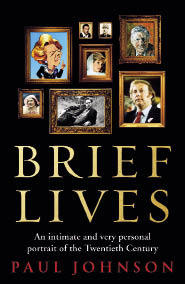Where would the popes, presidents and princesses of the world be without Paul Johnson, the former editor of the New Statesman, and much loved columnist in this and other periodicals? As his latest book shows, he is an all but indispensable asset, a social equivalent of the Admirable Crichton.
Take Kenneth Kaunda, for example, President of what was Northern Rhodesia. Paul writes: ‘I came across [him] at Salisbury Airport, where he was in difficulties with the authorities. I managed to extricate him and we flew to Lusaka together’. Phew! Stephen Spender was distressed by some remarks made about him in an American publication:
I wrote a piece in The Spectator, expressing the book’s faults, and as a result the plan for an English edition was dropped. Stephen was always profoundly grateful.
Nikita Khrushchev had pretty similar feelings when Paul printed his letter in the New Statesman. Indeed, ‘it did the paper’s prestige a lot of good and helped to start CND’.
Not that everyone involved in CND matched Paul’s own high personal qualities. Canon Collins, for example (‘I used to meet him at Kingsley Martin’s flat in the Aldwych and later at J. B. Priestley’s for weekends’), ‘was a striking example of the total lack of spirituality one finds in prominent Anglican divines.’
Paul, as readers will quickly become aware, is an excellent judge of character. General Pinochet, who entertained Paul and Marigold Johnson to tea (‘tea is the most important meal in Chile’), is ‘perhaps the single most misjudged figure of the 20th century’. His help to Britain during the Falklands War ‘saved hundreds, perhaps thousands, of British lives’. As the Johnsons tucked into peach ice-cream, croque monsieur and seafood salad, there was evidently no time to discuss the victims of torture in the General’s life-enhancing regime, nor the hundreds of people he had bumped off, but perhaps Paul was able to share with the General his view that Picasso was ‘probably the most evil man I ever actually came across’.
Unfortunately, he does not share with the reader of this book his reasons for thinking this, and I have searched in vain in John Richardson’s biography of Picasso for the great painter’s views on Paul Johnson. Maybe Picasso, like Cardinal Hume, to whom Paul gave a piece of his mind during a visit to his local RC church in Bayswater, ‘was always thinking of the media’. You and I might not know what other people are ‘always thinking’ about, but then we do not have Paul Johnson’s razor-sharp perspicacity.
Nor his strong moral antennae. He castigates the late Alastair Forbes for name-dropping. No one could accuse Paul of that ‘tiresome propensity’, as he calls it. Rather, from his teenage years, it would seem as if personages whom the rest of us only read about have appeared to him and wanted to be his friend. Sir Winston Churchill came out of a lift in a hotel in Lytham St Annes and offered the teenage Paul a cigar. When, as a young journalist in Paris, Paul watched the Coronation on television it was with the Duke and Duchess of Windsor.
Sometimes, in his eagerness to share his memories of these great figures with us, Paul contradicts himself a bit. In the course of one paragraph about Princess Margaret, for example, we read that ‘she never had a real home of her own’ and, eight lines later, ‘People sneered about her house in Mustique. But it was all she owned of her own’. Princess Margaret may not have possessed much, but at least she had Paul to talk to. Like Princess Diana, she clearly found his advice indispensable.
Once I was sitting by her at a country house garden party, having a good talk, when a peculiarly obnoxious and pushy social climbing journalist tried to join us. I froze him out and he moved away reluctantly.
No one could call Paul pushy or social climbing. Nor could the author of thousands of ‘Why, oh why?’ articles for the Daily Mail possibly be mistaken for a journalist. (David English, who commissioned most of these pieces, is dismissed as a ‘shit’ in these pages).
Nor is it just the royal family who love Paul. When he met Frankie Howerd, he was able to tell the great comedian that
Tycoons and generals and politicians may have the power to rule and crush and stamp on us. But only great comics, like you, Mr Howerd, can raise us up above the human condition and show the way to the stars.
It brought tears to the comedian’s eyes. ‘That’s the nicest thing anyone’s ever said to me’, he muttered.
Howerd joins the rest of Paul’s admirers, along with Karl Popper, who wrote him fan letters, Muriel Belcher, Pope John XXIII, David Ben-Gurion, General de Gaulle, Nancy Mitford, and the Reverend Sun Myung Moon, all of whom have had the privilege of sitting at his feet.
You can’t please everyone all of the time, of course. When Barbara Castle was 80, for instance, ‘I painted for her a beautiful card. I know she got it, but she never acknowledged it’. Curious, that. Paul puts it down to the fact that he had become disillusioned with the Labour Party. Maybe she just didn’t know him as well as the Queen, for example, who could playfully say, ‘Stop bickering you two!’ as Paul ribbed one of her ladies- in-waiting.
Some of the people in this book, such as T. S. Eliot or Chou En-lai, only met Paul once or twice. Had they known him better, they would assuredly have wanted to tell him, as he said to Frankie Howerd, that he had shown them the way to the stars.






Comments